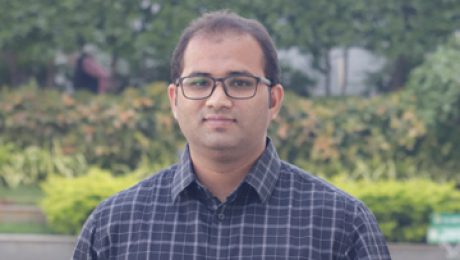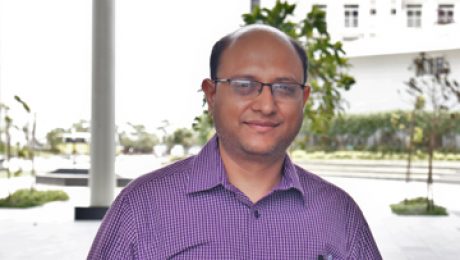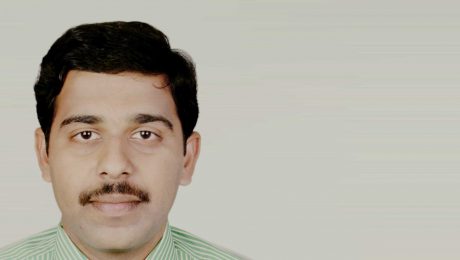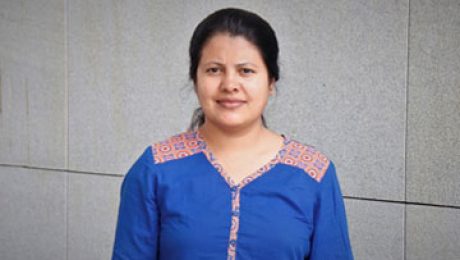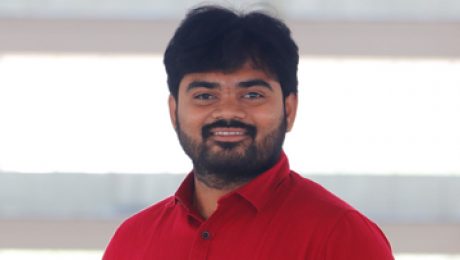Dr. Ranjana Mehta
- Published in Faculty, Mathematics Faculty, SEAS
Dr. Sutharsan Govindarajan
- Published in Assistant Professor, Biological Sciences Faculty, Faculty, SEAS
Third international conference at SRM University AP, Andhra Pradesh campus
Asian Consortium on Computational Material Sciences-International Conference on Material Genome (ACCMS-ICMG) and Fracmeet Conference
The campus welcomes international and national researchers along with members of ACCMS and Fracmeet organizations to take part in two parallel international conferences hosted by SRM University AP, Andhra Pradesh on 5th-7th February, 2020. The 3-day conference was inaugurated by the guests, Prof. Yoshiyuki Kawazoe, Tohoku University, Japan, Dr. Purusattam Ray, IMSc, Chennai, Dr. D. Gunasekaran, Registrar, Dr. B. Sivakumar, Deputy Registrar, and Prof. Durga Rao, Dean-SLABS. ACCMS-ICMG 2020 Convener, Prof. Ranjit Thapa, Department of Physics, and Fracmeet 2020 Convener, Dr. Soumyajyoti Biswas, Department of Physics, initiated the launch of the abstract book by the guests and dignitaries to begin the conference.
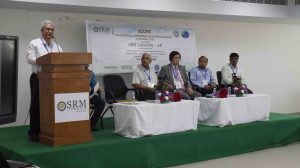 Dr. D. Gunasekaran, Registrar, addressing the audience on the inaugural event of ACCMS & Fracmeet conference.
Dr. D. Gunasekaran, Registrar, addressing the audience on the inaugural event of ACCMS & Fracmeet conference. Dr. Gunasekaran welcomed all the guests and addressed the audience. He introduced the university by recalling its infrastructural dominance, mentioning the eminent faculty, and discussing the collaborations with the University of California, Berkeley where students are sent for semester abroad programs. He also emphasized on the exposure offered to the students through international and national internships. “Our university encourages the young researchers through UROP where the students individually or in a group take up mini-projects under the guidance of our faculty. “Our faculty has published more than 120 journals in the last one year, along with 23 sponsored projects and 64 proposals that await funds from the agencies. SRM University AP, Andhra Pradesh is also collaborating with Indian Railways to build Hydrogen Trains, and Amara Raja Group on Energy Storage”, Dr. Gunasekaran pronounces. He also expresses his gratitude to the distinguished guests and assures to extend extensive support from the university’s end.
The Asian Consortium on Computational Materials Science (ACCMS) was set up in 2000 to promote research and development activities in computational materials in Asian countries. Prof. Yoshiyuki Kawazoe says “Computational materials was not a coined term in Japan when we started off this organization 20 years back. We merely had 7-8 participating nations who met on virtual platforms regularly or at conferences once in a while. In order to optimally utilize our resources and manpower, it is widely felt that we should have a ‘real’ organization to steer young researchers towards computational research. It is envisaged that the conduct of the International Conference on Material Genome at SRM University AP, Andhra Pradesh will lay the foundation for an active center of ACCMS on campus.”
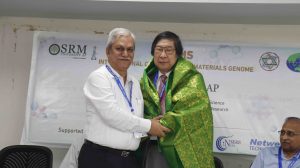 Prof. Yoshiyuki Kawazoe and Registrar at the opening of the conference.
Prof. Yoshiyuki Kawazoe and Registrar at the opening of the conference. 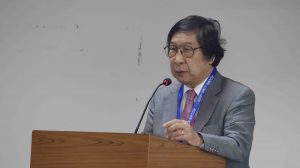 Prof. Yoshiyuki Kawazoe addressing the audience.
Prof. Yoshiyuki Kawazoe addressing the audience. He further addresses that the purpose of ACCMS is to solve large probabilistic problems through Quantum Mechanics based calculations followed by Machine Learning (QM/ML). “We are aiming at developing language and characters prior to the western nations and secure a superior position for Asian countries”. Few themes to be covered in this chapter of ACCMS conference includes “Machine Learning for materials”, “High-throughput Computation”, “Polar Magnetic Materials”, “Thermoelectric Materials”, etc.
Fracmeet conferences are being organized for over a decade to focus on an aspect of Material Science – “Mechanical Properties of Complex Materials.” The multidisciplinary collaborative meetings of this organization welcome scholars from Chemistry, Physics, and Engineering domains, along with people from the industry. Prior to this, the annual conferences and meetings of Fracmeet were held at IMSc., Chennai, where Fracmeet was initiated. For the first time, SRM University AP, Andhra Pradesh, having exceptional infrastructure and facilities, is hosting this conference in collaboration with IMSc. This year, Fracmeet is aiming at discussing “Micromechanics of failure in disordered material” in this conference.
 Dr. D. Gunasekaran, Registrar, Dr. B. Sivakumar, Deputy Registrar with the convener, Dr. Purusattam Ray.
Dr. D. Gunasekaran, Registrar, Dr. B. Sivakumar, Deputy Registrar with the convener, Dr. Purusattam Ray. The conferences will be held in parallel sessions for 3 days, from 5th to 7th February 2020, where delegates will be presenting their papers and discussing important issues to develop unique solutions for addressing challenges.
For more details, please visit: https://srmap.edu.in/accms-2020/
- Published in Conferences, Physics
Dr. Siddhartha Ghosh
- Published in Assistant Professor, Faculty, Physics Faculty, SEAS
Dr. Pankaj Pathak
- Published in Environmental Science Faculty, Faculty, SEAS
27th INTERNATIONAL CONFERENCE ON SYSTEMS ENGINEERING
ICSEng 2020
Dr. Vadivel organises Special Session 3 (SS3)
Dr. A. Vadivel, Associate Professor- Department of Computer Science and Engineering in SRM University, AP- Andhra Pradesh is organising a Special Session at 27th International Conference on Systems Engineering at Las Vegas in USA. Details about this conference can be found below-
Conference Organisers:
This series of International Conferences is jointly organized on a rotational basis among three institutions:
- University of Nevada, Las Vegas, USA;
- Wroclaw University of Technology, Poland; and
- Coventry University, UK.
In 2018, the series of the conferences was joined by University of Technology Sydney, Australia.
Date & Place of the Conference:
Between August 25-27, 2020, in Las Vegas, NV, at the University of Nevada, Las Vegas, USA.
Scope of Conference:
The Conference will cover the general area of Systems Engineering, with particular emphasis on placedon applications. It is expected to include sessions on the themes given at: http://www.icseng.com/topics.php
Dr. Vadivel is organising Special Session 3 (SS3)- Deep Video Analytics and Big Visual Data: Computational Models, Algorithms and Applications. Details about this session can be found at
http://www.icseng.com/sessions.php
The proceedings are published in the Springer series Lecture Notes in Networks and Systems and are indexed by ISI Web of Science Proceedings, DBLP, SCOPUS, Google Scholar, and Springerlink. Selected papers will be published in the Open Computer Science Journal and the International Journal of Electronics and Telecommunications.
Important dates:
- Papers due: March 21, 2020
- Notification of acceptance: April 20, 2020
- Paper registration due: May 17, 2020
- Camera-ready (final) papers: May 17, 2020
Special Session Organizer:
Dr. A. Vadivel
Associate Professor
Department of Computer Science and Engineering
SRM University, AP- Andhra Pradesh
Neerukonda, Mangalagiri Mandal, Mangalagiri
Andhra Pradesh 522502, India
E-mail ID: vadivel.a@srmap.edu.in
Important Links/ Reference:
Main Website: http://www.icseng.com/
Submission of Papers:http://www.icseng.com/submission.php
Registration: http://www.icseng.com/registration.php
- Published in News


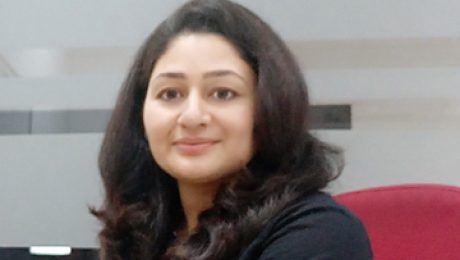
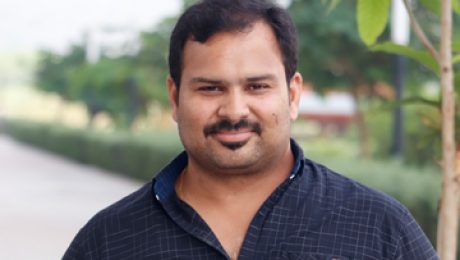
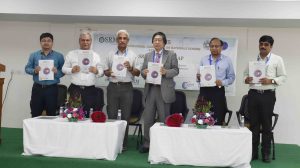 Abstract Book launch by dignitaries.
Abstract Book launch by dignitaries.